#add drums add other wind instruments more strings and such
Explore tagged Tumblr posts
Note
Btw this is going to be VERY long But I had an idea for "Haha, what if Ultrakill had a musical" and then proceeded to send this huge ass cluster of messages: (Slightly edited with some other ideas or general edits)
Prelude would....unsure. Possible electronic but also like ? INDUSTRIAL. Or more towards Repo!'s style... Limbo would totally be more wind instruments in the music but also....some strings...like harps.. V2's fight...their first fight is cool so like...unsure...maybe some bass guitar... Lust? Keyboards....why not...synths....electronic music Gluttony...I'm thinking brass and drums...screw it, add a cello in there, some deep string instruments...More deep strings with some brass and a little bit of drums... And for Gabriel's intro ? Keep in the violins and some of the electric guitar, but add some more vocals...He'd totally have a good solo... God, the little interludes would go so good in terms of drama... Greed...I kinda like the theme they had going for the "ancient Egyptian" type of stuff...so keep that for sure V2's second fight...bass but more intense. Add some VENGANCE. Wrath...some sterotypical pirate-y music but for the Ferryman...closer to Gabriel's for the connection...add his litmotif or somethin..but Ferryman themselves seems to be kinda string instrument-y.. Heresy...some more vocal but like...deep dark string instruments...and organs... Gabriel's second fight...kinda like the first but again, more intense and emotional, more intense throughout but the emotional bits become clearer in phase two...yum...add some organ Second intermission...oh hella dramatic...add some brass in there.... Violence.. The levels are so wildly different... I like the music box they had at the start but I'm not sure if musicals can do that... But still, eerie at first...intense after Then for Light up the Night ? Oug, organs. ORGAN. AND BRASS. But also some string...but a good blend of cello and violin...like some kinda like...loud but also something's...off..but also keep the accordion...or just put in the entirety of D.R.D.O.E.S? in for the start, since it seems pretty acheivable with like...normal instruments... 7-3 is more strings but also like. Harrowing/somber FUCK SHIT UP ON THE DRUMS/PERCUSSION FOR EARTHMOVER. Huge industrial inspo for sure...drums and brass..maybe organ Mirage's I think would also be a bit synth-y or keyboard but also the second half would be kinda the same with the vocals cutting in once she gains some hope. Actually..for the first half do keep it more the same with the woodwind instruments... Minos...oug...violins. Deep sorrow but also a hint of somethin kinda intense. Like the moon. The slight intensity for his anger to Gabriel SISYPHUS....drums...something intense but not from anger...like motivation...some brass ?
But also would they have V1 like Chell in the Portal 2 musical where they're silent most of the time but speak for some songs ??
Or hell, have the Terminals be narrating it !!
-🪱
-
23 notes
·
View notes
Text
Let's talk about Yinu's boss fight...
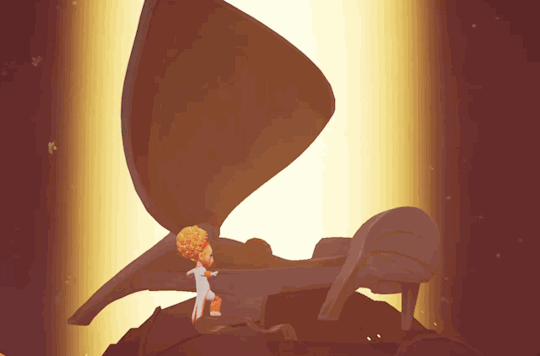
Yinu is the third NSR artist we face in No Straight Roads, alongside her mother who I'll refer to as Mama. Yinu is my 3rd favorite NSR artist not only for her character but the fact she plays neoclassical music! There's a really interesting connection I want to make later but without further ado let's talk about Yinu.
"I'll show you why they call me the Golden Maestro of Vinyl City!"
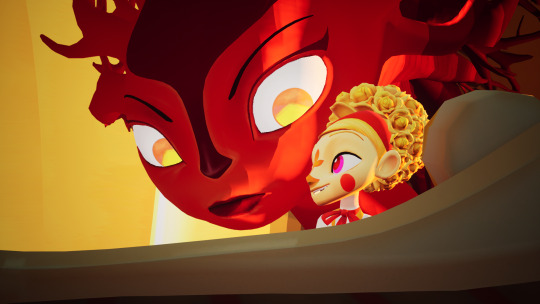
Yinu's battle goes like most of the others......except you don't fight her...you fight her mother. Mama will appear after you break the gate and will hold Yinu out of harms way, shielding her when you get rid of all the strings. Mama functions as the main obstacle you have to get through to get to Yinu. She will keep Yinu away from you for the entire battle, focused on mainly keeping Yinu performing.
She starts out as simply being behind the curtain, then in the second phase she grows and lifts up the stage into the air, and finally she uses herself as a sort of cage. You defeat her but it isn't over you're interrupted by Yinu who is angry at EVERYONE and furiously plays her piano.
You finally reach her and we hear something audibly break. The cutscene plays and we see everyone falling. No one is hurt in the fall but.......
Mayday and Zuke broke Yinu's piano.

Yinu plays neoclassical music which consists of piano, strings, and wind instruments. I absolutely love Yinu's theme not only because I love classical music myself but because it's so melodic and really evokes emotion. The rock version, while not my favorite, is also really good at using guitars and drums to replace the strings and winds.
One element I love is that the furious piano playing towards the end of the song stays in the rock version as well. It's such a nice touch to add to keep in the same in every version of Yinu's music. When I hear hear theme music I can imagine her enjoying herself, playing her piano for her fans but also for herself and her mother. I hear passion when listening to Yinu's theme which says a lot than having to express it with more words.
The next time you listen to her theme I want you to really listen and see what your mind comes up with when listening to it.
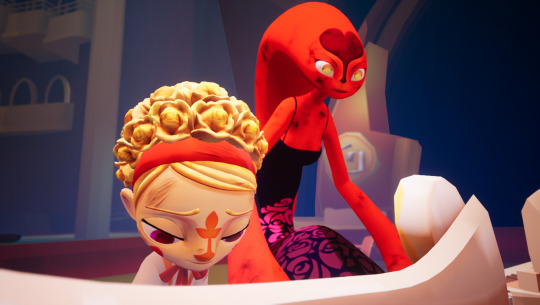
B2J's overthrowing Yinu's concert reminded me of the rise of popularity for rock in the 1950's and it subsequently becoming mainstream in the 20th century.
With popular music such as rock, jazz, and the blues becoming so popular classical music was forgotten about and had to find its own niche radio stations. Even today any type of classical music is basically forgotten or isn't looked as fondly upon as pop or rock music.
When B2J destroyed Yinu's piano this thought solidified itself as them getting rid of classical music, quite literally drowning Yinu out until you're trying to reach her. May and Zuke got rid of Yinu's neoclassical music in her district.
They put down a music genre just so rock can become popular again.

Conclusion is Yinu is an S-tier boss fight and she has so much untapped story that I didn't go over.
Thank you for reading, Dj Subatomic Supernova is up next.
#perse's writing#let's talk about..#my writing O_O#nsr yinu#yinu#yinu's mother#nsr#no straight roads
80 notes
·
View notes
Text
Heartbeats
Something old: no prior knowledge of my WoL or his stories needed. I'm not going to edit this one from its original state bc I still think it holds up. You may have read it in my google docs once, but I've never posted it!
The harvest festival was coming up soon. The few Xaela who lived in the mountains of Coerthas would gather and share the bounties of their tribes in a celebration of boisterous music, warm fires, an overabundance of food, and swatches of colored linens wildly waving in the northern winds. The very grass itself swayed in the cool breeze as if in barely-concealed anticipation; the verdant blades reflecting the light of the warm evening sun as it set below the peaks. But by the fire of the small tent on the edge of the Kha Iloh, a miqo'te sat throwing small twigs in the fire with a look of undisguised displeasure.
It wasn't as if the boy didn't enjoy festivities. As the only child to his parents he was obligated to attend and express their family strength in some capacity this year. He had just turned eight summers, and it was his chance to prove himself to his own tribe - but also the others of the mountains, as well. But that in itself was the problem, wasn't it? The boy looked at the drum next to him, its taut hide glowing reddish-orange with the setting sun. Nearby lie a discarded wooden mallet, its sides worn smooth by generations of hands grasping it for the very same purpose he was to. The Kha were artists and traders, but of no particular singular skill. They were highly social among their peoples back in their native lands - or so his mother had told him. It was how they had come to live where they were now. Though his father had a much darker take on the story.
He leaned over and picked up the drum, placing it in front of him, legs crossed as he was taught. At the festival the Kha played music, the loud beats of their sonorous drums compelling the other tribes in their feats of strength or cunning and providing the heartbeat of the event itself. His father had said it was the most important role of them all, and Chiteni never doubted what his father had to say. The other boys scoffed and sulked because they wanted to hunt and show skills the other tribes found more noble, but Chiteni remembered the past couple years or so. The powerful strokes and the low thrum of the men as their mallets came down thunderously in unison. The power that conveyed. The teamwork and coordination that their tribe valued and understood. The chorus of stringed and wind instruments the women played to add a treble to the bass; the breath to this beating heart.
He picked up the mallet and gave the drum a solid THWACK with all his might, his violet tail curled tightly by his side in apprehension. Nothing. Just the smallest of sounds. Not even a fraction of the way it sounded when his father would demonstrate in their small gatherings, Chiteni's mother by his side playing along - the breath to his heart. The miqo'te placed the mallet on the ground again and kicked the drum away from him, his eyes glowed with unshed tears. His father would be wroth if he knew, but Chiteni didn't care. His frustration and sadness clawed up through his chest and choked him. The idea of having nothing to show - nothing to prove his family's presence and worth among the hundreds who would come - the thought burned like red-hot coals in his throat. "Too weak to be Kha," the elders might say. He imagined the derision in their voices, how it nipped at him and stung at every turn. But they were right, weren't they? The other boys were well over a head taller, their arms built like Ishgardian iron, the sides of their faces adorned with small but beautiful obsidian horns that varied as much as the shapes of the falling leaves from the trees. They had no trouble fitting in as they should, he was sure.
Chiteni's ears flattened in shame as his mother came out from the tent. He averted his gaze as she carried a heavy iron pot over to the fire pit and hung it above with practiced ease. Her azure eyes watched him from the other side of the flames, the blue rings cutting through the red and orange like stars through a hazy gray twilight. She made her way over to him, collecting the drum from where it lay as she went. He watched her small but deft hands grasp its aged sides, wondering how someone so fragile-looking coud be so strong.
Interrupting his thoughts, she said in a low voice, "What's wrong, Chinua?"
His tail tip twitched in nervousness. He'd never lie to her, and they'd find out eventually. "I can't do it," he managed to choke out. He didn't want to cry. He didn't want her to see how weak he was on the inside, too. "It doesn't- it's not loud enough. I'm not strong enough. Why can't I be like everyone else? I want to make you proud, I don't want them to make fun of you! They already hate me so much, I don't want to make them right about us!" He buried his face in his hands to hide the tears he couldn't stop. Everything everyone ever said to him for being different, small, weak - not a Xaela. He was used to it, but the shame of them being right was too much, and they were finally going to get a chance to prove it. In front of everyone. Their stares and disgust and annoyance that they'd let someone like him here were coming home to rest in his heart - though not for him. For the ones who protected him.
His mother leaned over and wrapped her arms around him and he leaned into her without complaint. Her son's body shook with suppressed sadness, his face still hidden in his arms as the fire crackled and the sun sunk at last behind the hills; brilliant stars seeking to replace its light so the people didn't have to fear another night. They sat there on the ground a while together until his tears were spent. She ran a gentle but strong hand over one of his ears and said quietly after a time, "What is it that a Kha cannot do?"
He looked up at her then, his lavender eye full of worry and red from crying and the other buried behind his mop of hair. She smiled warmly - warmer than any fire or cover of furs. The smile his father said was the best thing Hydaelyn had ever created. Chiteni never doubted what his father had to say. "Nothing. There's nothing we cannot do," he replied from memory.
She grasped his shoulder, a playful but fierce light in her glowing eyes. "Precisely. So tell me what is the matter and we will figure it out. We are Kha and there is nothing we cannot do."
Chiteni explained how he wasn't strong enough to make the drum beat. No matter how hard he hit it, it wouldn't resound for him. His explanation carried tones of all the doubts and self-hatred he felt for being different at all; the words were worth far more than their meaning. Words he'd kept to himself when the other boys tried to tease them from him. Questions he had that he was afraid to ask. His mother held him and listened, never interrupting or insulting him. After a while she let him go and said gently, "I'll be right back, ok?" He nodded and exhaled, no longer as upset but still unsure how to tackle the problem. She left him there by the fire and went into the tent, the night sky stretching out before him as the shadows of the mountains carved a hole into the distant stars. He could smell whatever was on the fire as the breeze carried it to him, and it made his stomach growl. Father wasn't home from the festival preparations yet, and it may be some time still as the trek was long. But the days had grown shorter, and the boy still worried, capable as his father was.
When she returned his mother had on her festival garb. Feathers gifted to them by Ixali merchants from exotic birds were braided into her skirt, and the furs had been dyed a beautiful deep blue to match the rest of the Kha in the ceremonies; the black interior lining looking warm but not restrictive. She sat beside him again, this time with her stringed instrument. Her deft fingers found purchase atop the stem and a small thin bone piece in her other hand plucked the strings gently, letting whisper their sweet notes into the cool night air - a chorus for the crackling fire. "Chinua, I want you to tell me what you can do."
Confused, he thought for a moment but came up with nothing, bewildered. "I don't understand."
"What do the other boys see when they look at you?"
"They don't see themselves."
"Then what is it they see?"
"A skinny kid with big ears and a fluffy tail."
She laughed hearing that, her voice like chimes, light and airy. "What can Chiteni Kha do?"
He thought about it again. He thought about the races they'd have to get to the Iloh. He thought about climbing trees - how he loved to drop down on their shoulders and how they'd tumble to the ground together and laugh, winded. He thought about how good he was at slipping from their headlocks and how he could swim. How he could sing like his mother taught him. As he told her these things, her eyes glowed and a smile played across her lips as she picked the strings in time to his thoughts. They tumbled from his mouth freely, these things he loved. Things about himself.
On the day of the festival Chiteni was nervous. He had practiced hard in the week running up to it, but this was still new to him. His father had not been angry, however, but proudly strode in with his son, both in blue as they took their places among their kin. Leaves danced across the grass and the colorful linens of the banners of the tribes fluttered in the breeze. Cookfires adorned the southern edge of the camp, their tantalizing smells wafting this way and that on the wind as the gathered Xaela waited patiently for the Kha's performance; a showcase before every tribe shared their week together and mingled their talents. Men young and old sat in a firm line, their mallets lifted in unison. The girls and women were adjacent to them, fingers on the strings, eyes closed in concentration. They formed a circle all told, and as the other tribes stood around expectantly, Chiteni stood up. He walked to the center of the circle and poised himself there. All eyes were on him. The glowing stares of many different peoples followed his movement, their rainbow of eyes glittering at him like stars in the night sky lighting the way through the darkness of uncertainty. He was nervous, but this was what a Kha could do.
It started low. The thrum of the bass made Hydaelyn herself seem to tremble in anticipation. The strings came in slowly, their beautiful differing sounds winding up towards the clear blue heavens, carried high on the wings of falling auburn leaves. A second line of bass filled the circle, and all the world seemed to go quiet to listen. A steady beat began to form as the heart of the Kha began to hum. Her heart beat and her breath caressed the ears of those who ventured close. Not merely a song but an existence worth celebrating. There was nothing they couldn't do. Chiteni swung a small disk methodically over his head. A 'chakram' his mother had called it. The other rested at his side until he lifted that one, too. He began dancing in time with the music, his tail swirling around him as his brothers, sisters, and those between proudly demonstrated their passion.
For a moment he felt he didn't even exist. That they were all one person. Simply in the mountains on a clear sunny day. Time and self melted away. There was no difference between them, no space nor distance nor voice of fear or doubt. No au ra, no miqo'te; no weak, no strong. Just the heartbeats of a great and wonderful thing.
Author's Note: This one's a couple years old now. I have always only shared it with people privately - this story that is sort've central to my WoL and his uncertainties and problems. He didn't have a poor upbringing but he has always felt an undercurrent of not belonging his whole life. And it's not because he looks different than those who raised him, though he certainly thought so as a kid. There is a deeper reason that maybe I'll talk about at some point.
His mother is Surelun - it means 'treasured amulet.' And his father is Od Mazaalai - which means 'bear star.' I have an idea cooked up that a couple of his attacks (were he a boss in Arcadion) are Sirius and Procyon. The dog stars. Sirius (Chiteni) being the greater dog and Procyon (Silver) being the lesser. Bc Chiteni's name [Chinua-teni] means 'of wolves' so he sortve has a dog theme lol And naming some of his abilities after the dog stars is a reference to his mother's eyes and his father's name, but also how he sees himself as a person.
Anyway this was my VERY first story I wrote for him so I hope it's still enjoyable! I know it remains a part of my canon for him. I was so nervous about headcanon when I wrote this LOL I had to delete a disclaimer I'd put in it bc I was worried ppl would dislike that it was my personal take! I'm happy to have been wrong about that.
4 notes
·
View notes
Text
‘Read The Room’ Instrumental Notes
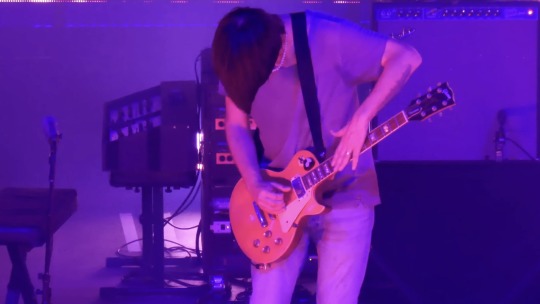
Jonny dramatically muting the strings of his late-70s natural finish Les Paul Standard during a performance of Read The Room in Cleveland on July 11, 2023 (Ryan J).
Verse
Read The Room starts with just a guitar through a single-repeat delay. Well, technically two guitars: the same guitar part is recorded twice, with one recording panned hard left and the other panned hard right. Each one has its own delay. Jonny almost certainly used his Boss DD200, given the clarity of the delay sound (a Space Echo would be too warm in the highs). If we count quarters at ~61.5bpm, we can hear that the delay time is set for a single quarter note.
There’s also medium overdrive and a flanging effect added to Jonny's guitar. The overdrive is probably Jonny's Boss SD1, which he's found a new affection for with The Smile (since 2007, he's used a Boss OD3 with Radiohead instead of his older SD1). The flanger is almost certainly from the EarthQuaker Devices Pyramids visible on Jonny’s board in studio photos.
At 0:09, Thom’s bass guitar enters. Based on live usage, he's probably playing his vintage, modified Gibson EB0. You can also see that bass in a photo from the the Wall of Eyes zine, which we included in our last post.
At 0:13, the drums enter, with Tom playing a stuttering pattern on the kick and snare, with occasional cymbals and open hihats for emphasis.
At 1:07, Jonny’s Sequential Prophet 5 REV4 adds a nice descending counter-melody (at least, it's probably the Prophet based on studio photos and similarity to the live tone). When the synth enters, Jonny switches to plucking muted strings on his guitar for a totally percussive sound, which leaves space for the synth to stand out. At live shows, he mutes the strings rather dramatically, sliding his hand up and down the fingerboard to vary the sound of the percussive plucks.
At 1:37-1:41 some slightly open hihats lead us to the next section...
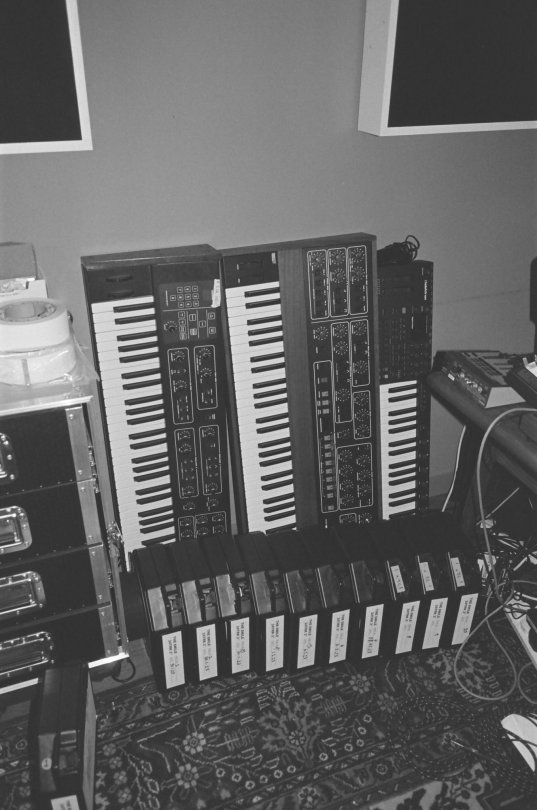
A photo from Jonny's home studio in Oxford, showing his Sequential Prophet 5 REV4 nestled between a 1980s Sequential Prophet 600 and an Elektron Digitone Keys. This photo by Sam Petts-Davies was originally posted on the Smile's twitter on October 31, 2023, but was definitely taken much earlier since the band were on tour at that time.
Chorus
At 1:41, the song switches to a softer “chorus” section, and a center-panned acoustic guitar becomes the main rhythm instrument. However, Jonny’s left and right panned electric guitars keep playing, adding subtle swelled notes. He’s probably using the “freeze swell” trick he first used for the Skirting On The Surface outro solo — more info in this post. However, it’s hard to say for sure, given the amount of woodwinds in this section. Robert Stillman's clarinets and Pete Wareham's flutes enter more clearly at 1:53. They add a rich, undulating texture through to the end of the chorus at 2:08.
For most of the chorus, we only hear a gentle hihat pattern from Tom. But at 2:00, we first hear cymbals, then the kick and stuttering snare from the verse enter to lead us back out of the chorus.
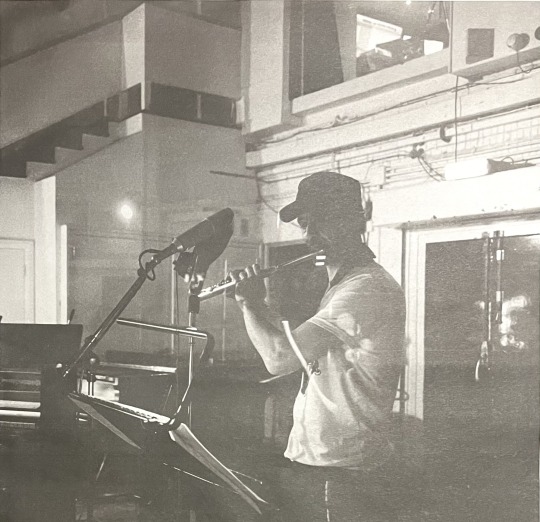
A photo of Pete Wareham playing flute in Abbey Road Studio 2, from the Smile's Wall of Eyes zine. Wareham previously collaborated with Tom Skinner’s past band Sons Of Kemet.
Verse 2 and Chorus 2
At 2:08-2:11, the start of the next verse, we briefly hear the main riff on the single acoustic guitar from the chorus. Then Jonny's two hard-panned electric guitars return at ~2:11. This verse (2:11-2:40) mainly repeats the instrumentation from first verse, but with more cymbals and more intense vocal delay. However, we do get a left-panned clarinet playing the counter-melody at 2:25-2:36, replacing the synth from the first verse. We also hear some fun sliding noises — seemingly from a “delay time” knob being turned — at 2:26-2:30.
The second “chorus” (2:41-3:11) brings back the acoustic guitar, swelling electric guitars, woodwinds, and gentle hihats from the first chorus. The main difference is that the winds play a richer texture, and Jonny’s two electric guitars start to add spacier delayed notes at ~3:00 (possibly with his Boss RE-202 Space Echo pedal).
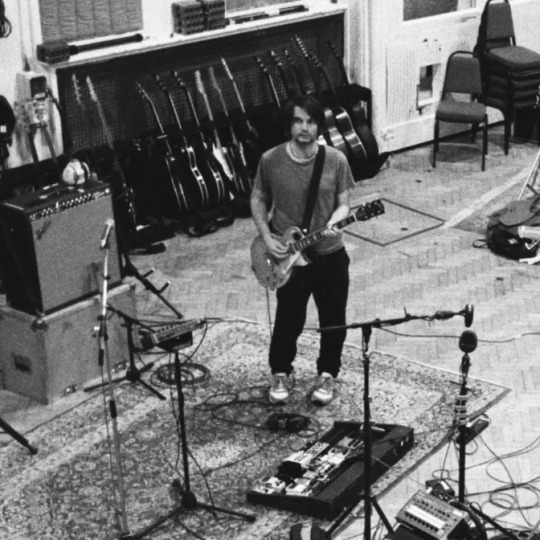
A photo of Jonny in the live room at Abbey Road Studio 2 from March or April of 2023 (Sam Petts-Davies). We can see his EHX Freeze, Boss SD1, Boss DD-200, and Boss RE-202 in the bottom row. His EQD Pyramids is at the end of the top row. For more info on his pedalboards, check out Jonny's page.
Coda
The coda begins at 3:12 with a right-panned single electric guitar from Jonny and a cymbal crash from Tom. Jonny plays a riff that initially feels pretty simple, until you notice that he keeps skipping eighth notes. There's a few ways to divide it up, but the full pattern is 22 eighth-notes long (two measures of 11/8, though it's easier to count as two measure of 6/4 with the last eighth note or each measure skipped, which also feels closer to the way the band play it).
Unlike the previous sections, this guitar has no delay or other effects. Instead of delay, Jonny’s riff makes use of open strings to give a fuller, multi-voice sound. On the studio recording, his B-string is detuned to an A for this section, allowing him to add an open “A” ringing over his riff. This is pretty notable, because the song’s main riff used an open B-string in standard tuning! At live shows, Jonny doesn’t bother with the high “A”, presumably because he has no time to detune the B-string or to switch guitars. So that's a little extra studio magic!
Jonny most likely played his late-70s natural finish Les Paul Standard for most or all of the studio recording. He's seen with other guitars in a few studio photos, but his tone on this track has a richness that's characteristic of his Les Paul through his Super Reverb — particularly his clean tone in the code.
The cymbal crash from the start of the coda slowly fades from 3:12-3:19. Then at 3:20, a couple of snare hits call in a new pattern of kick, snare, and closed hihat. The pattern is reminiscent of the "motorik" beat found in a lot of Krautrock, with a snare on 3. But the skipped eighths in the riff make the beat much more varied than in a traditional Krautrock track.
Thom adds a distorted bass guitar at 3:23, mirroring Jonny’s riff an octave below. He’s probably using his EarthQuaker Devices Plumes pedal for the added punch. In live footage, we can also see Thom and Jonny grab plectrums at the start of the coda. Thom may have been using the Plumes earlier in Read The Room, but the plectrum really emphasizes the punch.
When Thom’s vocal re-enters at 3:45, there’s a ton of vocal layers and reverb. The layers all seem to match the main vocal, so it might a dual delay setting from Thom’s Strymon DIG pedal, albeit with some heavier reverb added to the delays. At live shows played after the Abbey Road recording sessions, Thom had a drone from his Moog Matriach playing during this section, but it’s not present on the album.
At 4:05, Jonny adds a second electric guitar layer, panned hard-left and playing patterns with a new single-repeat delay. At live shows, he relied on Thom to keep the riff going. But on the studio recording, his right-panned riff guitar keeps playing too.
Tom brings back the cymbals in earnest from 4:13-4:48, bringing the song to its climax. Then, after a choirs of Thom say "everybody thinks so" at 4:48, the cymbals and vocals drop out (with a long vocal delay fade-out). The guitar, bass, and drums continue up until the track ends abruptly with another statement of "everybody thinks so".
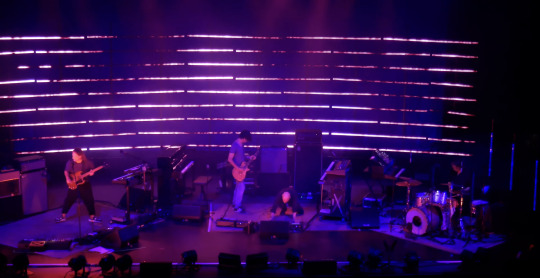
In this shot, from the The Smile's show in Cleveland on July 11, 2023 (Ryan J), Jonny's tech can be seen tapping in a dotted-eighth delay during the start of the coda section. Jonny only uses the delay during the second half of the coda, but his delay time is different from the rest of the song, so it needs to be adjusted while he plays the initial coda riff. Thom can be seen with his vintage Gibson EB0.
#The Smile#Read the Room#Wall of Eyes#Tom Skinner#Thom Yorke#Jonny Greenwood#Skirting On The Surface#Staircase#Thin Thing#Present Tense
13 notes
·
View notes
Text
TOILET BAND HANAKO KUN!
——
CHAPTER 1: Band.
——
“… Have you heard?” She spoke softly into the microphone as soon as it was turned on along with the radio.
“There is a rule regarding that staircase that you must never break.”
Slow, rhythmic melodies played when he strummed the strings of his ginger orange guitar with a guitar pick, decorated with random cat stickers, put on by another male, that just wouldn’t come off. He left them there until he was able to find a way to get them off of his precious instrument.
“You must never step foot on the fourth step. Why? Because… You will be taken to the other side.”
“Taken, to the otherrrr side~” Sung another person, standing right beside the green haired girl, holding another microphone. Violet and mauve, covered in various stickers and paint splatters on the bottom. His voice was smooth and calm, despite the words being deep.
Then drums started, still soft and faint, the person with the sticks trying to bang as light as possible to match the tone of the start of the song. Guitar still strumming, and now a keyboard is being used.
“Down, down belowww. To the darkest, deepest, path you’ll gooo.” He continued, eyes closed and head swaying with the flow.
“Limb, from dangling limb. They’ll pull you apart, down to countless pieces.”
The drumming tempo started picking up, so did the guitar, and now the drummer and guitarist were playing more fast and furious, creating a new rough and exciting rhythm.
“Now you’ve ruined the stairs.” The girl sang.
“It’s painted with crimson blood.” He continued. “Yasuraka ni o yasumi kudasai~”
“In piecesss~”
Now the instruments were louder than before. The drums are still banging with the occasional cymbals. The bass guitar’s volume was turned up, not enough to cover the singer's voice, because it was still so quiet. And the keyboards settled with matching the singer’s vocals, it wasn’t a noisy instrument anyways, especially since the player wasn’t an aggressive typist.
They continued playing like this.
Nobody expected the short, black haired, brown skinned boy, the one who was the most childish and reckless out of them all, to actually be a good singer. Because as they kept playing, kept up with the song, and the lyrics of the boy flowed throughout the room like lovely wind, they all figured this was the best outcome for them.
The boy did add unnecessary additions to the song that weren’t there before, but heck, it was still bada**.
As they got closer to the end of the song, the drummer decided to close their eyes as did the guitarist, the typist, and the lead singer. Wanting to just feel the atmosphere of the room, the melody of their instruments and his vocals clashing together in the best way.
The song was closer to ending. The guitar slowed down again after its solo, going with the rhythm it had when they first started playing. The singer's voice was higher.
“Taken to the other siiiide, to the bottom of the underworld, the top of the stairs will take you.” The green-ette sang, voice being in the background of the main singer.
“Have you heard? Number 2?”
The singer stopped singing, and the instruments had to keep going.
The drums continued to bang, harder and louder than throughout the whole song, now that it had the spotlight. Alongside the guitar, as it became more distorted on purpose.
But as the song was now about to end, and the drummer banged on the bass, planning to end it off with a ding from the hi-hats. The time was right, and the drummer hit two of the hi-hats with each cherry wooden stick, and the sound along with the dings of the cymbals was the sound of crunchy snapping.
The song finally ended. The guitarist and typist stopped playing, because of the ending of their strain, and cause of the sound they hear almost all the time while practicing. As well as a voice grumbling from the back of the room.
“D**nit! I broke them again!”
Everyone in the room turned to the drummer, looked at him, and then at the two broken parts of the drumsticks rolling on the floor on each side of the drum set.
Mitsuba Sousuke sighed, dropping the remains of the sticks onto the floor by his feet, and rubbed his face with both hands from embarrassment and frustration.
“… Jesus, Mitsuba-chan. This is like, the fifth time..” The guitarist sweatdropped.
“Oh shut up, airhead.” Mitsuba pulled his head up from his hands and rolled his pink eyes, the left one being hidden by his curly hair.
Hyuuga Natsuhiko put his hands up when Mitsuba glared at him, and the lead singer of the group spoke up.
“Mitsubaa, you need to stop breaking the sticks!”
“It’s not my fault!” He claimed, dropping his head down and looking into his lap when being faced with amber eyes.
Yugi Tsukasa walked over to the broken pieces of dark cherry wood, picking them up and inspecting the jagged edges of the sticks.
When looking up slightly, Mitsuba expects Tsukasa to be looking at him with downcasted eyebrows, shaking his head and tutting. But instead, he sees the smaller boy smiling down at the sticks in his hand.
“Y’know, maybe we don’t have to throw these away again? We could probably try fixing them!” He suggested, looking up at Mitsuba and giving him his usual wide toothed grin, the one Mitsuba couldn’t help but secretly admire.
The pink haired boy stilled, then slowly nodded while a small shy smile plastered on his face, along with the hotness of his cheeks coming to be.
“Um.. Yeah, maybe we could..?”
“And if that doesn’t work,” Tsukasa started again, pulling out his phone and starting to type. “I’m sure you could use broken wood for something else, right? Like, using them for some type of art pieces?”
Everyone internally questioned what kind of art piece the boy could possibly make with broken drumsticks, but they didn’t further think about that. Tsukasa could make something out of anything.
While Tsukasa was still on his phone, the green haired girl sighed.
“Well… I’m sure the song went well,” Nanamine Sakura said, pushing curly strands of hair out her face. “We’ll check it when we get back to the Broadcasting room.”
Currently, the band of pre-teens and second year teenagers are in a closed, deserted garage in the middle of nowhere where non-human beings are stranded. Nobody was in the area but them, though. So they found it a perfect place to try and finish their first song, named ‘Misaki Stairs’ in their fresh album ‘Rumor’. Since the club room they use to brainstorm and hang out in was too small for a whole band set up.
They decided they would use this garage for playing, and their club room for producing their music.
The band members agreed, and collected their belongings, getting ready to head out of the room.
Tsukasa walked over to a corner of the garage and picked up a long furry black thing, cooing at it saying, “Did you have a good nap?” The thing responded by purring into his arms.
“What is that?” Natsuhiko asked him, looking at him over his shoulder while he zipped his guitar shut in it’s black case.
Tsukasa turned to him, revealing an animal. His pet, that they didn’t even realize was here in the first place. The same pet Tsukasa let around them all the time.
Miyu, the strange cat Tsukasa always carried in his backpack, and somehow always appeared around them no matter where they were, opened its eyes to look at the confused looking band members she knew were Tsukasa’s friends. She quickly snapped her eyes at Sakura, and jumped out of her owner's arms. Walking over to Sakura and meowing at her, close by her left foot.
The black and white cat watched Sakura’s face contort into a deadpan.
“Tsukasa, why.. Is your cat in here?” She asked the boy who was gathering his backpack and putting both his and Sakura’s microphones in their respective cases.
“Oh! Because she wanted to listen to our first official song!”
They looked back down at the cat, who was bobbing its head like it was agreeing. Sakura shook the topic off, and started walking towards the button that opened the garage door.
When it opened all the way they all walked out of the garage, being faced with a scenery of mixed colors in the empty sky that belonged to the Far Shore, the realm of all supernaturals and non-human beings.
Mitsuba instantly pulled out his camera being hung around his neck, and snapped a picture of the sky above. He didn’t usually take pictures of pretty things like this, they couldn’t come close to the pretty-ness that was himself, but it was more odd than the sky of the realm of humans, and odd things deserved a snapshot.
There were also other weird things in the Far Shore too. And besides, Tsukasa was staring at it like the beautiful, strange thing it was, and he never planned on keeping the picture. As soon as it came out, and he shook it to get rid of the black, the picture showed the perfect shot and he gave it to Tsukasa.
Right inside Tsukasa's open right palm appeared a floating, misty black thing, with a small blue swirly dot in the middle. In an instant, the same black smoke clouded their vision and engulfed them with the intent of taking them somewhere else faster.
Natsuhiko spoke up, not seeing the person he wanted to speak to because of all the mist.
“Tsukasa, you also have to help me get these stickers off my guitar and case y’know! And stop tampering with them!”
He heard a giggle from the boy he was talking to.
“I’ll try!”
Once their sight became clear again, they all were in another place, and a place they knew well. The Broadcasting club, taking place in the school they all attended.
And once they settled in, they got to work. Checking over their song, edited it, and once it was deemed perfect, contacted their album cover producer and started on releasing it to their oblivious human and random supernatural audiences.
Now this was the start of The Broadcasters.
——
NEW AU ONESHOT!
Next chapter is: Band. ( 2 )
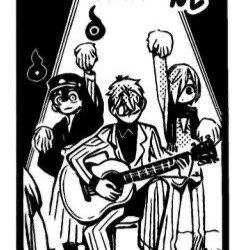
#anime#tbhk#jshk#jshk broadcasting group#tbhk broadcasting group#jshk au#tbhk au#jshk oneshot#tbhk oneshot#jshk fanfic#tbhk fanfic#jshk toilet band hanako kun#tbhk toilet band hanako kun#jshk tsukasa#tbhk tsukasa#jshk mitsuba#tbhk mitsuba#jshk sakura#tbhk sakura#tbhk natsuhiko#jshk natsuhiko#yugi tsukasa#tsukasa yugi#hyuuga natsuhiko#natsuhiko hyuuga#mitsuba sousuke#sousuke mitsuba#band au#broadcasters otp#slight tsumitsu
12 notes
·
View notes
Text
WTF is Jangle Pop?

If you’ve read any of my little write-ups you know I have a longstanding love/hate (mostly hate) relationship with subgenres. I understand the need to more specifically classify music, especially when genres like indie rock are so vague, still it doesn’t make it any less arbitrary than gender. As a kid/teen I was obsessed with subgenres and while they’re a lot more specific nowadays, god could I tell you the difference between Garage Punk and Slacker Punk, much to the chagrin of anyone who happened to be in earshot. Because of this predilection, wired into my brain from years of surfing the tags on Bandcamp, whenever I catch wind of a subgenre new to me I have to dive deeper into it. An attempt to understand what makes that subgenre different from other closely related ones, as I said before, is an arbitrary one - after all literally none of this matters in the grand scheme of things, but also just like… let people enjoy things asshole.
youtube
I first heard about Jangle Pop earlier this year looking at the RYM reviews of Ducks Ltd. fantastic sophomore record Harm’s Way. Mistakenly I originally thought of it as an indie rock record, one that I was fairly excited about because of its guitar based nature and lack of unnecessary electronic aspects so many in the indie rock umbrella have turned to recently. But oh how simple I can be…
This moment reminds me of a time I was on a trip with just my brother and my dad - my dad was in the shower listening to a Creed radio station he had made on Pandora. Upon getting out of the shower he asked us “what genre would you consider Creed to be?” “Uhh, Grunge I guess?” we replied. It took a second but finally he said, “Well, if this is what that is, I guess I like grunge then.” If Harm’s Way by Ducks Ltd. is a jangle pop album, well fuck I guess I like jangle pop.
One of the biggest things I noticed in those RYM reviews were a lot of claims about this album being “no nonsense, old school jangle pop” or “some of the best jangle pop [they’ve] heard in years.” This lead me to the assumption that, despite no subgenre being a monolith, I could use this album as a better way to understand this new (to me) idea of what jangle pop truly is and what its parts are.
Instrumentation-wise this album utilizes single notes on clean guitars as opposed to playing full chords. That doesn’t mean the lead guitar is just shredding the whole time, they’re simply playing rhythm guitar with single notes, giving them the ability to add little flourishes whenever they can. The tone of the guitar is clean, only going into distortion at the beginning of On Our Way to the Rave. This is coupled with a heavily present bass sound, working just about the same as the guitar, except being a bit more lead-heavy. Usually the two don’t take the lead at the same time, sharing the spotlight by playing simple rhythms behind more impressive parts on the bass/guitar. I think this trade-off is what gives the genre the first part of its name, the jangle part. Less math-rock than the closely related (name-wise) genre of twinkle-emo, it may sound insane but you can tell the difference between twinkle and jangle. I don’t know how to further explain this point but trust me, if you listen to the two side by side, you will be able to tell.
The drums play a big role in this as well, as with most genres it’s the driving force behind everything. A lot of times it takes that job seriously, with no better way to describe the sound than driving. There aren’t any waltzes in here, with no slowing down really until the very end, it sounds exhaustive for the person on the skins. I think without this steady drum beat the jangle of the stringed instruments would be less noticeable, truly taking on a supporting role. Every so often it’s sprinkled with little fills, borrowing sounds and influences from bands like The Cure and R.E.M, who some consider to be earlier examples of jangle.
So now that I musically know the themes of this genre, being given, from my research, the quintessential jangle album of the year. I start to think tangentially, what has influenced this, where have I heard these sounds before, who started Jangle Pop???? I’m answering that question myself, with no real outside research because who really cares, and in my opinion the current state of Jangle Pop started in 2008 when Vampire Weekend recreated the genre with their self titled album, Vampire Weekend.
youtube
While this album is a bit more heavily produced, and there are potentially a lot more jangle themes in their sophomore follow-up Contra, I think the twee aesthetics and juvenile lyrics of college life, plus the heavily present bass and less so present lead guitar, sets up the future of this genre perfectly. Songs like Oxford Comma and Campus feature the guitar tones and smarter "educated person" lyrics that continue to make up the genre today. Percussion-wise it is different, VW has always been more syncopated or twinkly with their drums, but in future songs like Cousins and Worship You it’s easier to see the relation. On that previous topic I do feel like their perfect syncopation plays a big part musically, inspiring the future of the subgenre. While there is a good trade-off of bass and guitar on Harm’s Way, the moments where the two come together with the drums has real power behind it.
All of this leads up to the previous Friday, October 18th, with the release of Boyscott’s first record in almost a decade, Spellbound. What’s special about this album is that it’s the first new album I’ve heard that’s made me go “oh… that’s jangle pop, I understand what jangle pop is.” It plays on the driving aspects of the drums found in Harm’s Way while also incorporating ideas that are very clearly influenced by early Vampire Weekend. Songs like Moosehead that uses the ever popular organ sound found in A-Punk and even at the beginning of Ducks Ltd.’s rocker of a track Train Full of Gasoline.
To be honest this album seems to mainly be Vampire Weekend influenced, which makes sense, afterall Ducks Ltd. is moreso their peers as opposed to one of the most influential indie bands of the late 00’s early 10’s. Ducks is clearly more influenced by real classic jangle pop bands whereas Boyscott, at least on this album, helps support my hypothesis that Vampire Weekend recreated the genre, we love to see it. The real cross-section between Harm’s Way and Spellbound is in their vocal performance. Not to assume influences, like I have been this entire article, but you can definitely hear some Black Francis of the Pixies or, the more modern, Christian Zucconi of Grouplove influence behind both of their understated, raspy yet calming voices.
youtube
Beyond that this album really just feels like a DIY produced Vampire Weekend album. Arthur Kill to Lima is a fantastic run of songs that promote this clear influence on the release. Boyscott is still able to make it their own, mind you, and they do focus more on the less chord influenced side of jangle pop that Vampire Weekend has never really tapped into. They also use their surfer rock influence to make the songs almost more relatable, as opposed to the crisp clean impossible to replicate general aesthetics of Vampire Weekend’s early work. This gives them a little more grime, a little more edge, a little more ripped jeans than a pair of pressed tan slacks. Being able to go from the lovely syncopation to these robust warm choruses puts a true sense of comfort behind this release, perfect for the upcoming cold air.
Overall: Jangle Pop, and I’m so glad I don’t have to type out that phrase again for such a long time, is a genre best taken in musically. If you aren’t paying attention a lot of it can sound the same, a general warm blanket of noise, but once you start looking at the parts individually is when the magic shines through. Clever guitars, present lead bass, breakneck drum fills that drive the genre, all of these work in sync helping create the feeling of jingle jangle - under the guise of pop music - that evokes the name of the genre.
Album Grades:
Harm’s Way by Ducks, Ltd. - A
Vampire Weekend by Vampire Weekend - B+
Spellbound by Boyscott - B+
#music#music review#youtube#music recs#new album review#new music#new album#new albums#indie#jangle pop#jingle jangle#vampire weekend#song lyrics#music genres#music history#music video#live music#indie rock#indie pop#Youtube
3 notes
·
View notes
Note
Can I ask another request? I see your frontiers playlist hasn't been covered much, so can you analyze Ares island movement 2?
Hello! Yes, absolutely! I'm all for more Frontiers requests, so let's get into it!
The island tracks are all atmospheric and mood oriented, to give plenty of space for Sonic to blitz across the huge landscapes. I love all the hand drums here, as well as the sitar--definitely checking off all the boxes for a desert themed level (although Ares Island is more volcanic). Maybe I'm thinking of "desert" because it reminds me of the Dusty Desert tracks from '06.
This has nice mixing to it too! It's fun how the acoustic guitar is all in the left ear, where as the other comping string is over in the right ear. It really adds a lot of body to it. The wind instrument that pops in halfway through--despite being a wind instrumentalist, I can't pin what exactly it is. You hear it in the Dusty Desert track too! I used to think it was a saxophone, but the way it's mixed here makes me believe it's something more in line with the rest of the instruments. There's a steady pulse to this track that isn't intrusive, but nonetheless keeps moving forward. Ooh, and toward the end of the track, we add some more colorful tones in the melody that really stand out compared to the rest of the track. All in all, it's very meditative, and a good contrast to the break-neck electronica of the speed stage tracks. Thanks for the request!
#ares island movement 2#ares island 2nd mvt#sonic frontiers#sonic the hedgehog#sonic#music#anon sorry i'm late on this--i've been sick :(
4 notes
·
View notes
Text
Week ending: 15th May
And we're properly back in real time, this time with three quite different songs from rockabilly artists who are honestly coming to feel a bit like old friends - or if not old friends, at least familiar acquaintances!
Scarlett O'Hara - Jet Harris & Tony Meehan (peaked at Number 2)
It's Jet and Tony again, with another very Shadows-style instrumental rock track. This time, it's Scarlett O'Hara, named after the character from Gone With the Wind. It's a 1930s book (and film) but set in and around the American Revolution, which plays nicely into the pulpy Wild West feel that so many of these instrumental rock songs have. And indeed, there's something very grand, very sweeping about the tune here, especially when a horn comes in, halfway through. Between that and the snares, you're absolutely meant to think of the open country, dashing exploits of blockade runners, horses galloping aroun the place, a sort of romantic vision of old-timey America. There's little else linking it to Gone With the Wind in any more concrete way, except the title. But it's enough.
I think it helps that you have also got a lot going on - the tune feels busy, with saxophone, bass, lead guitar, rhythm guitar sometimes playing a completely different tune, brass, strings, backing singers, the works. It's a full, loud sound. And underneath it all, underpinning everything, those drums, which I think are the best part of it, especially about a minute in, when you get the highest-speed drum full I think we've had yet? It's like something you could imagine in an electronic song, just this high-powered, impossibly fast shot of manic drumming. Honestly, I wouldn't be shocked if it had been sped up, at least slightly, in post - it's brief, but really unexpected. But then, Tony Meehan was the Shadows drummer. So perhaps I should have expected it?
What I didn't realise is the fact that Jet Harris, despite officially being on the credit list for this one, didn't actually play on this track at all. That honour went to Joe Moretti, a Scottish session musician and guitarist who we've already heard contributing to things like Shakin' All Over. He's going to appear on at least two other Number 1 tracks, too. And yet, somehow, Jet's the one getting a credit here, and not Joe. Seems kind of unfair to me, but go figure. At least Tony's pulling his weight, with that drumming.
Two Kinds of Teardrops - Del Shannon (5)
Back to the world of songs that have lyrics, and not a moment too soon! I've generally found Del to be quite consistent, over the course of this project, and while this song is him at peak pop, it is still clearly a Del Shannon record, with that big rock and roll voice, complete with Del's distinctive falsetto, as he describes how his love's old flame made her cry-y-y, and how much of a shame that is.
Because yes, while Del seems to specialise in "you're the worst and I hope you get what's coming to you" songs, it turns out he can be sweet and romantic, when he puts his mind to it. The whole thesis, in this song, is that there are two kinds of tears. One is known as lonely teardrops / That come when lovers say goodbye. Del's current lover has had all too much experience of this kind of tears. But Del's gonna treat them better, he promises. I'll make you cry those tears of joy, he assures, I'll mend the heart he nearly destroyed. Which leads into the delightfully unexpected chorus, which is just Del promising to make his girl cry. Which is delightfully silly, and I love the little don't worry he adds in, just in case she took it in the wrong way. Just forget the lonely past / And the romance that didn't last / And dry those lonely teardrops from your eyes. D'awwww.
I am strongly enjoying the backing singers, here. They're that same very 1960s brand of female R&B backing singers you get in song like He's So Fine, and they've just got this slightly camp, cheesy charm to them that I love. They give the whole song a sense of lighthearted, teenaged gossipiness - the backing singers serving as a sort of whismical Greek chorus of commentators, backing Del up and furthering his romantic overtures.
This song was on an album with Little Town Flirt, and I do think that the contrast works in Two Kinds of Tear Drops' favour. It's a lighter, less mean-spirited song, and I like it a lot more.
Losing You - Brenda Lee (10)
And then, finally, a slower pace, waltz time, and a big, clarion-clear trumpet introduction. It's a lot, setting this grand, sentimental, almost nostalgic tone off the bat. My first thoughts, listening to this one, was that goodness, this sounds like it's come from a musical. It doesn't, but there's that same sense of drama here, that same feeling of Brenda really trying to show off with a big, emotional break-up ballad.
Don't sigh a sigh for me, she begins, don't ever cry for me / This is goodbye for me / I know we're through / I'm losing you. Which is already interesting. She's clearly broken-up about whatever's gone wrong here, but determined to take it stoically, not weeping and wailing, and not demanding her love weep and wail. Instead, she frames it as a natural thing. Not an expected thing, necessarily, but a rubbish thing that just happened. Our love and our devotion / Were deep as any ocean, she sings - a really naff line, by the way, sold only by the power of Brenda being Brenda - but things quickly and naturally changed as one day like the tide you began to change. What a flake! And yet, rather than raging, Brenda just puts in a performance that sounds tired, here. She's a wonderful performer, and you really do get the sense here that she's just done, worn out by the end of a relationship where all the energy and love has faded away, and ready, if not eager, to just let it die, already.
In all this, there's a lot of nice musical touches that I also appreciate, from the quiet, slinking drums, to the quiet but pretty piano chords and the little guitar touches, subtle enough that you barely notice them, but just keeping things moving along. Add some strings, a single operatic backing singer floating up above the other backing singers, and the trumpet, too, and you've got a recipe for something very stirring and emotional.
I could kind of see somebody covering this as a big 90s-style ballad, actually. And yet, a quick check online suggests a disappointing paucity of covers. Doris Day did a version, which I could see being pretty good. Al Martino, of all people, did one in 1964 - apparently he's still around and making music! - and Alison Krauss did one too, as recently as 2017. But surprisingly, there don't seem to have been many covers, otherwise. Missed opportunity, right there.
All three of these songs felt very different, but very competent, in their own ways. I do think, of all of them, Brenda's is probably the best, just quality-wise. Her vocal performance, the overall care taken with the song, the drama of it - it's excellent stuff! And yet, the prize is for the one I enjoyed, and honestly, I just wasn't in the right mindset for big dramatic heartbreak today. I needed something light, something fluffy and a little goofy. And thankfully, Del was here to help!
Favourite song of the bunch: Two Types of Teardrop
0 notes
Text
Recital Thought Processes
Gaia: Since this was about Earth, I wanted to base it off indigenous music, and after listening to different cultures, I chose Taiwan indigenous music and started out more monophonic to emphasise the growth later on. I used a pentatonic scale for that chant-like feel, and included gamelan instruments for a very rustic and traditional feel. I wanted to depict the evolution of earth, so I included a more lyrical section in the middle to signify the growth and beauty of nature. Finally comes the presence of mankind, and I had a more sinister and tense section to depict how man slowly starts to destroy the beauty of earth. I used a bass drum and extended techniques to replicate a taiko drum which starts that section. My other uses of extended technique was sul ponticello, to create a more sinister sound on the strings. I was inspired by Vincemendoza and Tandun for this piece as well.
Sea Minor: La Mer was very inspiring for me for my water piece, as I could feel the energy of the water through the piece. Water isn’t just stagnant or constant, there are irregular movements and the ocean in the morning is different from how the water acts in the afternoon or night. For this piece, I wanted to show how small droplets of water can become an entire ocean, and the feeling of a push and pull with the waves. I used pizzicato on the strings to depict droplets of water, somewhat like drizzles that drip into the sea, and a crescendo followed by an immediate dip in dynamic to emphasise the feeling of waves. For certain free atonal parts, I tried weaving the strings in and out with the same thematic movement and different entry points, and tied them together by having the winds outline the main melody. This created a more cohesive sound yet still keeping the woven and interlocking feel. I wanted a blend of different harmonic languages, so I took inspiration from Wagner who has some ambiguous pieces which change tonalities. To add to the feeling of water, I included a suspended cymbal to wash over the notes and signify waves crashing down. I ended the piece by trying to portray the shimmer of a calm bed of water, when the waves die down.
Fanning the Flames: I combined wind and fire together as I felt it was fitting that these 2 elements feed off each other and directly affects the other be in the same piece with 2 contrasting characteristics yet able to weave in with each other. For the element of wind, i used a simple motif and modified it throughout the section, and as it progresses I increased the tempo bit by bit to mimic the growing gusts of wind until it eventually became a whirlwind. After that dies down, I wanted to bring in the fire element starting with sparks, and the wind motif appearing occasionally to show it 'fanning the flames'. I used pointilism, pizzicato and col legno to show this. As the fire builds, i introduced a percussion section to increase the intensity and lead up to the climax of a huge sound mass where everyone plays high range trills and different interjecting rhythms at fortississimo. That eventually dies down to a single instrument, similar to how fire will always die down when there is no more air present. This piece was the most uncomfortable and unfamiliar for me to write, as I explored many different atonal and unique environments I never composed before. I had to throw away all tonal knowledge I had and stop thinking of harmony for certain parts. It proved to be effective as I always had the vision of what each section meant when I composed them, and every single note and rhythm had an intention and purpose behind it. That is why even though it still doesn't sound like my cup of tea, I feel that it still managed to serve its purpose in portraying my ideas.
0 notes
Text
Percussion
we focused on the diverse world of percussion instruments, and I’ve been really excited to dig into how each type of percussion can be used to add unique colours and rhythms to an orchestral composition.
We started by breaking down the different types of percussion, which is important because each family has its own distinct characteristics. First, we looked at pitched percussion, such as timpani, xylophone, and marimba. These instruments have a clear pitch and can be used melodically, adding harmonic support or even playing counterpoint to the strings or winds. I was surprised at how versatile pitched percussion can be in orchestral writing—not just as rhythm makers but as full-fledged melodic voices.
On the other side, we have unpitched percussion, like snare drums, bass drums, and cymbals. These instruments are more focused on rhythm and texture than melody, but they can bring intense drama or subtle colour depending on how they're used. I've been thinking more about how unpitched percussion can emphasize the rhythmic foundation of a piece, providing energy and drive to the music without the need for a clear pitch.
Then we looked at the metal family, including cymbals, triangles, and gongs. Metal percussion has such a sharp, bright timbre that can really cut through an ensemble. The sustain and resonance of gongs, for example, can create such an atmospheric effect. I hadn’t fully appreciated how much metal percussion can contribute to both the texture and emotional impact of a piece.
Next, we covered wood, non-metal percussion, such as the wood block, maracas, and castanets. These instruments bring a different type of energy—wooden percussion tends to have a more earthy, grounded sound. I’ve been thinking about using them to create lighter, more playful textures or to introduce a more rustic feel when needed.
We also explored membranous percussion, like the bass drum, snare drum, and tom-toms. These have a warmer, deeper tone, and I learned that their ability to create a range of dynamics—especially with the use of drum heads—can make them incredibly flexible. For example, a single bass drum hit can add weight and drama, while rapid snare drumming can create intensity and movement.
Lastly, we looked at keyboard percussion, which includes instruments like the glockenspiel and vibraphone. These are fascinating because they combine the melodic and rhythmic qualities of percussion, but with a more precise pitch. The glockenspiel, for example, has a bright, bell-like sound that can add a shimmering effect to an orchestral texture.
This week’s exploration of percussion has opened up new possibilities in my writing. I’m realizing that percussion isn’t just about providing rhythm—each type of percussion offers something unique, whether it's melodic potential, textural colour, or dynamic contrast. It’s about knowing when and how to incorporate these sounds to shape the mood and energy of a piece. I’m eager to experiment more with different percussion instruments and see how I can use them creatively in my compositions.
0 notes
Text
How Many Piano Notes Are There?
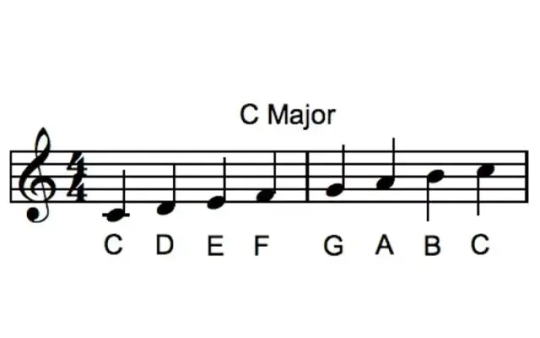
The piano, a majestic and versatile instrument, has intrigued musicians and enthusiasts alike for centuries. Central to its allure is the vast array of notes it can produce. Understanding the quantity and nature of these notes is fundamental to unlocking the full potential of this remarkable instrument.
The Basic Anatomy of a Piano
A standard piano is composed of 88 keys. These keys are divided into two main groups: the white keys and the black keys. The white keys represent the natural notes, while the black keys account for the sharps and flats. This simple yet elegant layout forms the foundation upon which the complex world of piano notes is built.
The Range of the Piano
The piano has an extensive range that spans from the lowest note, which is an A0, to the highest note, a C8. This wide range allows for a remarkable diversity of musical expression. The lower notes possess a deep, resonant quality that can add a sense of weight and drama to a composition. For example, in a powerful orchestral piece, the low notes of the piano can mimic the rumble of thunder or the growl of a large animal. In contrast, the higher notes are bright and piercing, often used to create a sense of excitement or to add a touch of delicacy, like the twinkling of stars in a night sky.
The Octave System
The concept of octaves is crucial in understanding piano notes. An octave is a series of eight notes that repeat in a pattern of whole and half steps. For instance, starting from C, the notes C, D, E, F, G, A, B, and then back to C form an octave. There are multiple octaves on a piano. The lower octaves have a more subdued and rich tone, while the higher octaves become progressively brighter and more ethereal. This octave repetition enables composers and performers to create melodies and harmonies that are both familiar and yet can be transformed in different registers.
Sharps and Flats: The Black Key Mystique
The black keys on the piano, which represent sharps and flats, add a layer of complexity and richness to the musical landscape. A sharp raises a natural note by a half step, while a flat lowers it. For example, C# is a half step higher than C, and Db is a half step lower. These accidentals allow for the creation of a multitude of different scales and chords. In a minor scale, the presence of flats gives it a distinctively somber or melancholy feel compared to a major scale. They also enable the modulation between different keys, providing a seamless transition and adding variety and interest to a musical piece.
The Role of Dynamics in Piano Notes
Dynamics play a vital role in how piano notes are perceived. The volume at which a note is played can drastically change its character. A soft, pianissimo note can create a sense of intimacy and vulnerability, as if whispering a secret. In contrast, a fortissimo note, played with great force, can command attention and convey a sense of power and passion. The ability to control dynamics across the range of piano notes gives performers the means to shape a piece, highlighting certain phrases, creating contrasts, and guiding the emotional journey of the listener.
The Relationship with Other Instruments
The piano’s note range and tonal qualities allow it to interact with a wide variety of other instruments in an ensemble. It can blend harmoniously with strings, providing a rich backdrop or adding counterpoint. With wind instruments, it can engage in melodic dialogues, trading phrases and building musical conversations. In a jazz ensemble, the piano often acts as a rhythmic and harmonic anchor, interacting with drums, bass, and brass or woodwind instruments to create a complex and exciting musical texture.
Conclusion
The world of piano notes is a vast and complex one. With 88 keys spanning a wide range, multiple octaves, the addition of sharps and flats, and the crucial role of dynamics, the piano offers an almost limitless palette for musical creation. Its ability to interact with other instruments further cements its place as one of the most important and versatile instruments in the world of music. Whether in a solo performance, a chamber music setting, or a large orchestral piece, the piano’s notes continue to captivate and inspire musicians and audiences alike, weaving a rich tapestry of sound that has endured and evolved over the centuries.
1 note
·
View note
Text
Ches Smith — Laugh Ash (Pyroclastic)
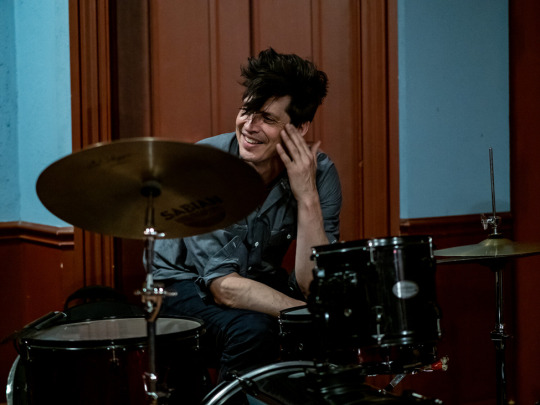
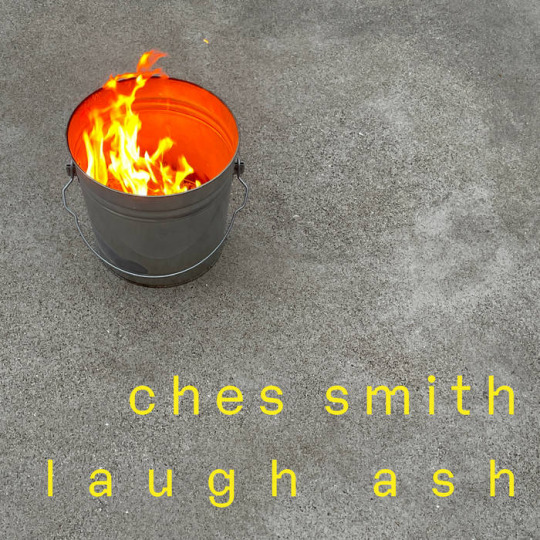
Percussionist and electronic musician Ches Smith enlists a who’s who of postmodern jazz/contemporary classical collaborators on his latest Pyroclastic recording, Laugh Ash. While his imaginative use of instruments and electronics has for years been distinctive, this recording finds Smith truly coming into his own as a composer.
The opening track, “Minimalism,” begins with a rangy tune played by trumpeter Nate Wooley and sung by Shara Lunon. The rest of the ensemble, made up of winds (flutist Anna Webber, clarinetist Oscar Noriega, and tenor saxophonist James Brandon Lewis), strings (violinist Jennifer Choi, violist Doyle Armbrust and cellist Michael Nicholas), bassist/keyboardist Shazmad Ismally, and Smith, takes up a furious ostinato, over which Lunon intones a spoken word monologue. A quick flourish finishes this curtain-raiser.
“Remote Convivial” is composed of an additive group of melodies for winds against another busy strings-and-percussion ostinato. Lewis and Choi engage in a squalling interlude, accompanied by a funk bass line from Ismally and economical drumming from Smith. All of a sudden, the music veers off, the acoustic instruments cease, and synths create sounds that recall early digital bleeps. As if this never happened, the group resumes, with an angular melody, sustained wind chords, and a busy string ostinato. The strings drop out, and Lewis, Webber, and Noriega close out the piece, repeating the tune over simple quarter notes from Smith.
“Disco Inferred” submerges the dance style in several polyrhythms played by the rest of the ensemble. Smith unleashes a synth interlude that reappears several times and keeps the groove moving while the other plays go their own way. “Sweatered Webs (Hey Mom)” and “Shaken, Stirred Silence” are afforded time for the musicians to stretch out. Strident chords for winds and undulating repetitions for strings are juxtaposed with solos by Wooley, Lewis, and Noriega. Lunon contributes more spoken word, her voice incantatory in demeanor.
“Unyielding Daydream Welding” begins with sustained octaves that soon start to undulate. A third of the way through, the drums and electronic beats kick in, over which waywardly crossing lines and vocal ah’s provide abundant syncopation. Lewis solos in a muscular outro. The final piece, “Exit Shivers,” begins with thunderous percussion, thrumming bass, a plethora of glissandos, and an altissimo sustained note. In another musical oasis, strummed cello, dyadic clarinet lines, and microtonal bends on flute create a slice of soft chamber music. After a thunderous crescendo, accompanied by string glissandos, Webber once again provides a discordant, effects laden solo. Noriega and Webber then trade bird calls while Smith adds metallic percussion to the proceedings. Lunon and the winds begin the final section, in which propulsive drumming and modern jazz-inflected playing solidifies the background. Noriega adds a virtuosic coda, followed by slow-moving tutti verticals to conclude.
The combination of intricate, composed pieces, often diverging at formal boundaries, and fulsome improvisation from everyone in the group makes for a compelling totalist offering that is one of my favorites thus far in 2024.
Christian Carey
0 notes
Text
Now that I'm home, I need to add @majorasnightmare's tags to the post:
#i can imagine being chosen to play lolth would itself constitute a THREAT#YOU CANT GET A MORE EXPLICIT ''SET UP TO FAIL'' THAN THAT#so you might even get your political RIVALS put into the position#which inversely gives them the oppurtunity to triumph above you and your schemes#in a ploy im sure lolth adores from both ends#because that dynamic entertains her no matter what#its also a fairly safe move politically too#if your rival fails she displeases lolth and is killed badly for it#however if your rival succeeds youve technically brought great honor and esteem to the web mother!#ITS SO GOOD!!!!
I wanna add these to the post 'cause they're an excellent addition. 10/10 love the idea that setting up to play Lolth would be a death trap by itself with the promise of unmatched glory - and who knows it might result in more than just favor among your people.
Some other things I'm throwing in that are tangential is the sound of it. Namely how strange (to us, the audience) it sounds.
Here's a brief description of drow music for reference:
Perhaps the strangest of drow art forms is their music. The children of Lolth enjoy strange, prolonged, wavering sounds that other races consider unappealing or even uncomfortable. These often seem atonal at first, but when combined through the proper techniques they produce a symphony of alien, haunting appeal. The dark elves possess a variety of unique instruments, including the vazhan-do, a complex lute with sixty-four strings that can be plucked swiftly for a torrent of notes, or bent slowly, producing a ghostly wail; and the ezhirkiri, a wind instrument that transforms the air blowing through it into the sound of agonized, yet strangely melodic, shrieks. Drow of the Underdark - p. 29
And there's a scene from Daughter of the Drow that describes an elaborate dance with magical enhancements:
All eyes were upon her as she began to stamp a rhythmic counterpoint to the drum. Her arms started an intricate weave, and one by one other drums joined in, as well as strange percussion instruments known only to the drow. Then a deep-voiced flute began to play a strange, compelling tune, a melody that had once been sung by elves in the Lands of Light, many centuries past. Those long-dead elves would not recognize their song; its fey magic had shifted and changed to reflect the beings who now played it. Beautiful still, the music retained all of the mystery of the elven race, and none of the joy. The drow had forgotten that emotion. But they understood pleasure, and they would pursue it wildly in an attempt to fill the unrecognized void in their elven souls. Daughter of the Drow - Chapter 5
Strange, atonal, alien, haunting. A ghostly wail and agonized, melodic shrieks. Ancient elven song that's now joyless. I think A LOT about what Drow music sounds like and I never have a good answer to this. But I think this paints a pretty good picture, at least conceptually. But I would struggle to offer up a concrete example of what exactly that sounds like.
The brain worm today is drow opera.
Yeah. Yeah, you read that right. Drow opera. [is this a thing already? If not it should be]
I've talked about Coranzan being musically inclined thanks to his mother's instruction and that he was an actor doing propaganda pieces for a while.
So naturally... My brain went to opera as a cross section of those things and now I'm obsessed with the idea. I am putting Coran in there for his pre-Surface days.
It's the perfect venue for entertainment, propaganda, political showmanship and positioning, grandeur, and not to mention the absolute sadism possible as a part of it. For the audience and the singers.
I might yap about this little by little over the day as I find pockets of time.
But. TLDR Wagner. Absolutely Wagner.
#Coranzan#Mog's mutterings#long post#anyway that's enough for now thanks for putting up with my long posting today#thanks for reading if you got through it like a champ
57 notes
·
View notes
Text
Robert Sheehan Is A Secret Supermusician
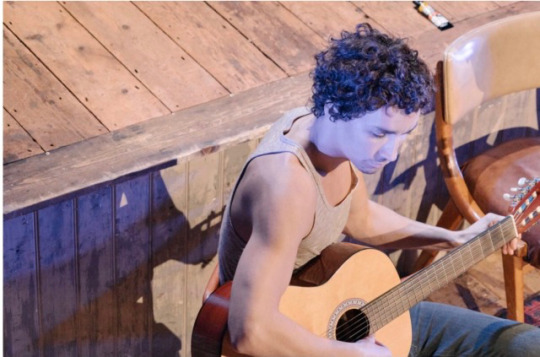
Seeing this shot again from a post by @philodenmonstera reminded me that Rob is a musician. Like, an actual one. He may not consider himself a particularly good one, but, like Roland, he is a multi-instrumentalist. And each of his instruments requires a completely different set of skills and modes of thought.
No seriously, think about it. He plays at least one example of every major category of musical instrument there is, except the keys category. He plays stringed instruments, wind instruments, AND rhythm instruments. And let’s face it, he can prolly pick out a tune on a piano, too. (We are intentionally not mentioning the theremin for reasons.)

Wind instruments: Tin whistle, recorder, possibly the flute cuz he knows the fingering and the lip position, and of course, his own wind instrument for whistling.
Have a look at a tin whistle and how it’s played. Fuuuuuuuuuuck that’s fast.
youtube
Stringed instruments: Banjo, guitar, and ukulele. All three of which have completely different tunings, the strings are in different orders, and therefore the fingerings on the fret boards are completely different, and you have to learn all new shapes to make for chords. And in the case of playing banjo, the picking hand uses completely different motions. No pick at all on a ukulele. A thumb’ll do. So he had to relearn both hands for each new toy he got. Playing one is NOT the same as playing another. (Though, since he plays a six string guitar confidently, that means he could also play a bass and a twelve string if he felt like it.)

Rhythm instruments: The bodhrán drum, spoons, and he knows how to handle himself with drumsticks well enough to play rolls. (No bad notes on a drum!) Again, all three rhythm instruments he’s chosen are completely different to each other. Drumsticks are traditional, we know what they look like when banging away, but rolls are among the most difficult things to learn, yada yada marching band. Spoons ain’t a bit like that. They’re spoons. Frequently played on a thigh, no less. And the bodhrán is unlike anything I’ve seen except some Native Americans’ hand-held drums. And bodhrán is equally as tribal — just the indigenous Celtic version. You run your left arm through the back, rest it on your knee if you want, and then flip flop your right hand in intricate patterns with a double ended stick you hold in your fist. (I suck at it.) Check it out... You’re welcome.
youtube
You can also hear a more modern usage of the bodhrán in the soundtrack of Lowland Fell during the controversial sexytimes scene. And that movie is all about feeling your tribal roots in your blood. (X)


“I play a few other things.”
And just like Roland and his secret multi instrumentarianism, Rob never talks about any of it ever. If he’s asked, he downplays it. All of his Bios talk about him learning to play a bunch of cute little instruments as a kid for fleadh / ceilidh festivals. People ask him to play the spoons in interviews, because they think it’s adorable and completely irrelevant as an “instrument” someone “plays.” (Tell that to the Bluegrass genre.)
Lest we forget, he sings, too. So add that to the wind instrument category.
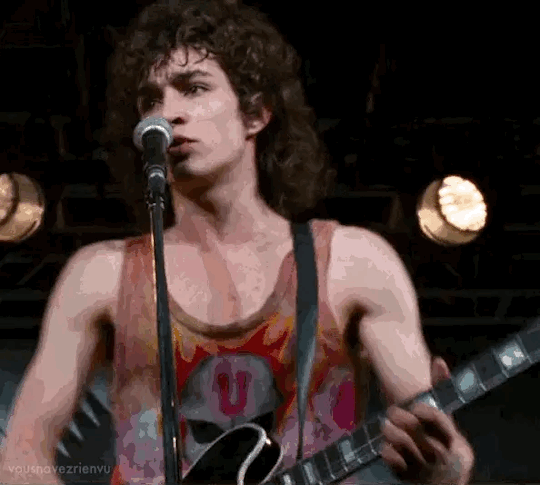
Ok, rant complete. Thank you for being the only person who read this far.
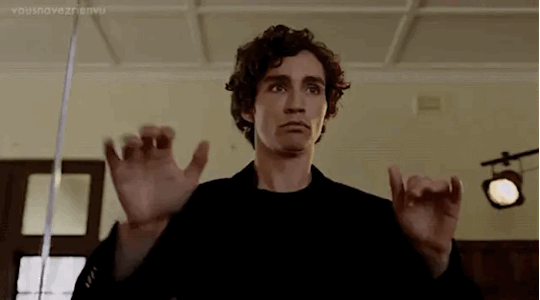
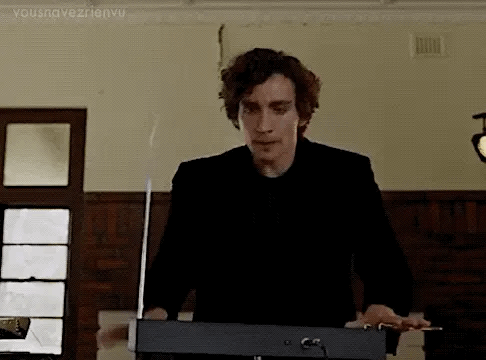
#robert sheehan is a musician#robert sheehan is a multi instrumentalist#robert sheehan is a one man band#robert sheehan is a secret supermusician#I am a very important historian of musician-y stuff#cute instruments like#banjo#tin whistle#spoons#and something with a really foreign and unpronounceable name that turns out to be a drum#bodhrán#pronounced BOW-run rhymes with WOW-run#oh yeah and also#guitar#six string#which means he could play a bass or a twelve string if he wanted to#ukulele#possibly flute#likely a snare drum 🥁#no bad notes on a drum!#have the composer remove that note#his lips are an instrument#not just an instrument of love#but also an instrument of whistling#you know how to whistle don’t you? you just put your lips together and blow#aaaaand singing#robert sheehan#rob sheehan#my rants#UPDATE: piano plonking confirmed
56 notes
·
View notes
Text
TDM Band Camp Headcanon
*note: some of the ideas came from a post or a story I read somewhere, but I can’t remember where. Also, as this is wind band, there’s no string instruments, and no electric instruments.
First of all, who plays what:
-Ruby: french horn, because it was arguably the most difficult and low-key the most important instrument in the ensemble
-Liam: percussion, for the himbo that he is (no shades here, I’m a percussionist myself), and specializes in playing snare drum, though can play everything in the department
-Chubs: oboe, demanding technical-wise, and a superior instrument in many ways
-Vida: trumpet. I think this one is very self-explanatory.
-Jude: alto saxophone. He wanted to play baritone sax but it was way too big for him that he could barely stand
-Zu: flute. Sweet, light on the feet as her.
-Nico: bassoon, and is constantly tired of everyone’s bullshit. He also does arrangements of popular musics or film musics upon requests (usually from Jude), but firmly rejected when someone requested Gangnam style.
-Roman: trombone, also for the himbo that he is
-Priyanka and Lana: clarinets
-Cate is their camp manager. She plays too but wouldn’t tell them what instrument it was.
-What would Cole play, you asked? Trumpet, of course.
-He’d be the legendary camp alumnus from a few years ago who’s gone on to have a career as a trumpet player, and came back to coach them (more to annoy the hell out of his little brother though)
-They’d have campfire nights where they play songs that they all know. Final Countdown was one of the songs that everyone knew. John Williams was also on the menu when requested. Ruby nails the french horn solo in Jurassic Park. Liam can basically turns everything into a drum set.
-Cole and Vida would drive to the other side of the mountain at dawn, and blast the camp with their solos of famous fanfares from across the valley to wake everyone up at 6. Everyone says they hate it, but secretly enjoys it because they were that good.
-They took Roman with them that one time, and he played Imperial March, which led to multiple kids waking up covered in cold sweat. Cate banned them from doing so since.
-Ruby, Cole, Vida, Roman, and Zack (who plays Tuba) formed a brass quintet, which Liam was absolutely salty about. They do enlist him when they need a drummer, though.
I’ll add more when I thought of them
#I know this is a little niche but let me indulge my 15 year old wind band pride a little#tdm#The Darkest Minds#Headcanon#ruby daly#liam stewart#tdm chubs#tdm vida#tdm jude#tdm zu#Suzume Kimura#tdm nico#roman volkov#tdl priyanka#lana volkov#cate connor#cole stewart
46 notes
·
View notes
Text
hello! it seems to be @aphrarepairweek2021 and I'm not one to ignore that! here's some... domestic denfin stuff for day 1, language. I've gone for a pretty liberal approach to the prompts this year, but that's mostly so that all my fics will fit into the same universe :> (it is also the same universe as two of last year's rarepairweek fics! I'll make a tag for it) (that is also the reason I had to call sve berwald and not torbjörn like I usually do ¯\_(ツ)_/¯) they will all be standalone little fics but take place in the same au, over the same sort of time period!
--
in major scale
pairings/characters: Denmark (Søren)/Finland (Tuomi), Estonia (Eduard), Sweden (Berwald), Hungary (Erzsébet) + past SuFin mentioned word count: 2219 summary: Tuomi admires how much Søren cares about other people. It inspires him to do the same.
--
A series of thumps and clomps heralds Søren’s arrival home. Tuomi looks up with amusement when the door of his little home studio in the back of their house bursts open.
“Tuomi!” Søren shouts. He brings with him the smell of recent rain and early spring blossoms.
Eduard, who is sitting behind Tuomi at his keyboard and wearing headphones, very nearly tumbles off his stool in shock.
“Søren!” Tuomi just returns, while his brother rights himself and glares. “You seem unusually excited.”
Eduard snorts, which makes Søren grin. ‘Unusually excited’ means something different when applied to him than most other people.
“Guess what!” he says, closing the door behind him and leaning against it. His socked feet are both tapping on the ground, with no rhythm to it. Tuomi is sure he couldn’t say what’s got into him; as far as he knows, Søren was just looking after his young nephews for the afternoon.
“Your brother didn’t hide the sugar well enough,” he guesses.
“No, that’s—well, he didn’t, but that’s not my point. Berwald’s gettin’ married!” Now, he waves his arms around wildly. “My brother’s gettin’ married, Tuomi! I’m so proud of him.”
Turning slightly, Tuomi exchanges an amused look with his own brother, who has taken his headphones off and is leaning forward over his keyboard, elbows planted over the keys.
“Now, Søren,” Eduard starts, using his haughtiest voice, which is very haughty. It’s an odd talent.
“Don’t you dare,” he interrupts, though he’s still grinning, “bring up the time he and Tuomi were plannin’ on gettin’ hitched, ‘cause that was ages ago and ain’t relevant anymore.”
“Alright, alright.” Eduard holds up his hands placatingly, and Tuomi just snickers. Søren’s right, he thinks; it’s been over fifteen years since then, and although the whole thing where he took up with the brother of the man who was nearly his husband was awkward at first, for all that it happened several years later, he’s since become good friends with Berwald again. It’s probably better this way.
“That’s great, Søren!” he just says. “And you’re gonna be the best man, I assume?”
“Of course!” His dark blue eyes crinkle at the corners, scrunching up his many freckles in laugh lines and dimples. Tuomi really admires how much Søren cares about other people, even if sometimes it comes at the expense of himself. Tuomi can always remedy that, after all.
“That means you’re gonna have to help with a bunch of organizing, isn’t it?”
“Don’t sound do skeptical of me, Eduard!” Pushing away from the door, Søren lightly strums the strings of an uncovered acoustic guitar sitting in its stand before taking a large step towards Tuomi and bending down to kiss him over the microphone between them, Tuomi angling his own electric guitar out of the way. He smells like sea wind and hair gel, and does taste distinctly sugary behind the smile his lips are still curved into.
Tuomi mutters, “I think you’ll do great. Berwald’s lucky to have you.”
“I hope so. Y’know, the boys are excited as anythin’.” Now, he practically melts, draping his long limbs over Tuomi and his guitar. He always does this when he as much as thinks about his nephews, Berwald’s young sons. Tuomi and Søren are very much the fun uncles. It is a title they both wear with pride.
Patting his jeans-clad ass affectionately, Tuomi pushes his nose into Søren’s wild coppery hair.
“Yeah? They’ve given their blessing, then?”
“Already fightin’ over who gets to be ringbearer.”
“Cute.”
The door of the studio opens.
“Whoa! Am I interrupting?” shouts Tuomi’s half-sister, bursting in.
Eduard, now leaning his head in his hands, says, “Please save me.”
“Berwald’s gettin’ married!” Søren shouts, into Tuomi’s ear. He gets along with Erzsébet far too well.
“Tuomi’s ex?” she yells back, and Eduard promptly loses it. He doubles over his keyboard in hiccupping laughter, shaking and pressing almost all the keys in a horrifyingly discordant tone. Søren looks betrayed in a very comical way. He crosses his arms as he turns to Erzsébet, folding his hands into the sleeves of his red knit sweater. Berwald made that one.
“She not wrong,” Tuomi tells him, holding back laughter of his own. Now even more comically betrayed, Søren turns back to him, with his dark eyebrows raised high and ready to deliver a quasi-outraged speech, but Erzsébet forestalls him.
“You need to make a song for the wedding!”
“Yes!” Tuomi perks up, almost poking Søren in the hip with the neck of his guitar.
“A song?” the man echoes, looking between all three of them. Eduard is now only playing a couple of notes at the same time, thankfully, and he straightens up fully to explain their family tradition.
“We always do it for weddings. It has to be something they’d like, and something the couple can dance to.”
“And then we give it funny lyrics,” Tuomi finishes, “about the person getting married. But we always make sure it’s good.”
“Well, I ain’t surprised about that part, ya snobs.” Søren shakes his head affectionately. He has absolutely no feel for music, but that just means that he appreciates things that most other people wouldn’t give their time of day.
It also means that he somehow considers Tuomi’s very musically inclined family to be elitist about music, which Tuomi thinks is dumb, but he’s not one to argue. He’ll leave that to his brother; it’s very amusing. As a matter of fact, Eduard is already narrowing his eyes at Søren, but doesn’t say anything before he continues.
“I don’t know if Berwald would like that, honestly. It’s not really something we do.”
“Come on, everyone likes music!” Erzsébet enthuses, walking further inside and skirting around Søren and Tuomi in the small space to lean an elbow on Eduard’s shoulder.
“Sure, he likes it, but, I mean—we ain’t like you guys, is all.”
No one is quite like his family, Tuomi thinks, but he appreciates that all the more these days. Søren is the most generous, openminded person he knows, and has broadened his worldview amazingly in the time they’ve been together. Not that his family isn’t openminded; they’re just less inclined to explore than Søren is.
Still, “Music is a universal language, isn’t it?” Tuomi asks him, bumping his shoulder into Søren’s upper arm. He inclines his head in agreement. “It doesn’t even have to have lyrics if you think Berwald wouldn’t like it. Or his fiancé, of course,” he adds, because he doesn’t know the man that well but knows he, like Berwald, doesn’t really appreciate being made fun of, even in good humor.
This is, again, unlike Søren, which is probably why it didn’t work out with his brother and does work with him.
Well, it’s part of it.
Erzsébet, the lyricist of the family, gasps dramatically at the mention of not having lyrics to go with the song, and coughs. She should really quit smoking. Eduard pats her back awkwardly, getting a face full of long brown hair for his efforts.
“And then?” Søren’s asking, but his head is still tilted thoughtfully, as if he’s considering it.
“Well, then it can be for a dance! Consider it a wedding gift from me.”
“His ex,” Erzsébet murmurs, recovered, and Eduard starts giggling again.
“His brother-in-law.” Tuomi blindly throws a guitar pick at her over his shoulder, which, going by the plink and following yelp, hits Eduard’s glasses instead.
Huh. That’s pretty impressive.
“Well, someone will have to teach him how to dance first—”
They all look away.
“—but that sounds awesome, actually! Would you guys be willing to play it?” In his excitement, Søren has leaned very close to Tuomi again, vision filling with his grin and his many, many freckles, and Tuomi can’t help but kiss the corner of his mouth.
“I’d love to.”
His siblings make agreeing noises.
“Right! Well, should I—what’re you guys workin’ on, actually?” Søren gazes around the small space as if hoping to glean clues. Which clues, Tuomi is not sure. He can’t really read music, after all.
“Just tinkering a bit,” Tuomi says. Eduard plays the first few chords of the most recent wedding song they’d written, several years ago already. Erzsébet slaps the cymbal of her drum set in apparent agreement, reaching behind her.
“Hey, I wrote some lyrics, actually,” she says. “I think they’re pretty good.”
It’s been years since they actually made original music that they deemed good enough to send out into the world, but their songs are still getting decent amounts of listeners on Spotify, which is nice; it’s mostly a hobby for all three of them, after all. Lately, though, Eduard and Tuomi have started seriously considering making some new material, and Erzsébet seems to be on board. She promises to send the lyrics to both of them. Although she, like both of her half-brothers and much to Søren’s amazement, plays several instruments, she doesn’t have much talent for composing.
Tuomi tried to teach Søren guitar once. It was fun, but very unsuccessful. He does like the drums.
That’s probably why he gets along with Erzsébet so well.
Deciding that today is probably not going to be very productive, all four of them go into the house instead, and Tuomi makes coffee while Søren hands out some cupcakes that he made yesterday, because Søren very much believes that food is a universal language. He isn’t wrong, if you ask Tuomi, but that’s mostly because Søren is very good at making food, unlike Tuomi.
They’ve all got their talents, he supposes, and it’s how they use them in combination that matters. Even if he’s been banned from using the oven for anything more than frozen pizza.
Eduard, of course, asks for the recipe, because Eduard didn’t get that memo about talents and has too many of them.
Tuomi’s siblings don’t actually stay around for very long after that, both promising to think about the wedding song for Berwald. It is mostly an empty promise on Erzsébet’s part, but that’s okay. Eduard walks away while muttering about waltzes, which Tuomi appreciates, because Berwald seems like a man—is a man, he knows this—who appreciates a bit of tradition, and he’s never tried to compose an instrumental, mostly classical song before.
“You’re adorable, you know,” he tells Søren, who’s standing behind him in the hallway of their house after having seen his siblings off. Søren just grins, rocking back on his heels, hands clasped behind his back and looking much younger than he is.
“I’m just happy for my brother.”
“I know.” Tuomi reaches up to flick some errant hair out of the way. “It’s really cute.”
He gets excited about the smallest things, Søren. Random dogs on the street and odd world records and warm coats and almost everything that’s even a little bit nice. It’d get annoying, Tuomi’s sure, if he weren’t so sincere about it all the time. He got very excited about their civil union as well, which was honestly mostly practical. Tuomi had almost wanted to get married, just to see his reaction to it, but he’d decided years before that marriage wasn’t for him, and remains glad that he stuck by that belief, in the end.
“You don’t mind, do you?” Søren suddenly asks, blue eyes searching Tuomi’s face.
“What? Oh, no, of course not. Berwald’s a good man, and he deserves to be happy.” He shrugs. “I know he’s always wanted the whole… Domestic thing.”
“Guy’s had a plan for a wedding since he was twelve or something,” Søren confirms, grinning. “Only took him thirty years and a couple kids.”
Tuomi knows; he was shown the plan, sixteen years ago, but he decides not to mention that. It’d been quite intimidating at the time; he’d only been 22 and much more interested in… Well, practically anything besides marriage.
Søren slings an arm across his shoulders, squeezing him tightly to his lanky form, and starts walking them both back to the kitchen.
“You’d know, I guess,” he muses, then pulls a face. Tuomi laughs.
“That one was your fault!”
“I know, I know. Don’t remind me.”
Tuomi stops walking, tilting his head up at Søren.
“You don’t mind, do you?” he asks. Turning back, Søren blinks at him.
“Obviously not,” he says, but he bites the inside of his cheek and furrows his dark brows, so there’s evidently something more there.
There’s another thing Tuomi had to be taught by Søren; reading body language. It’s not his fault his family is so unexpressive!
“But?” he prompts.
“I just hope I can do well for him.” Søren shrugs. “He’s my big brother, y’know, and I do kinda feel like I ruined his first chance of marriage sometimes. I know that’s dumb,” he adds hastily.
Tuomi mumbles, “Yeah, that was definitely me.” And then, “Like you say, he’s your big brother. He loves you. Speaking as someone with two older siblings, they might razz you a bit—”
“That’s just your siblings, Tuomi,” Søren interrupts, but the grin is back on his face and just as bright as before. “But I get what you’re saying. Thanks.”
Tuomi boots him with his shoulder, and he laughs, clomping ahead. Tuomi follows, quickly.
Before he eats all the other cupcakes.
#i can't typ a bunch of ttrs#tumbr sucs#aphrarepairweek2021#denfin#who is sve marrying? wait and see :)#hetalia#i mean if you look at those fics from last year you can Know but still#aph denmark#aph finland#aph estonia#aph hungary#u: human#u: rpw#fin#w: 2500#somewhere in the margin of this fic i wrote 'we go to tahiti we become mangoes'#which I guess means I was thinking about red dead redemption 2 but also#'we become mangoes' is absolutely the name of a band fin was in at some point#Much dialogue#den likes talking what can i say#oh god oh no it needs a title#uhhhhh#for the beginning of this fic I want you to imagine that vine#where the guy bursts in with light-up shoes like 'i got new shoes'
14 notes
·
View notes